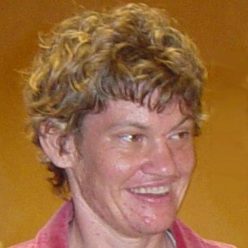Supports & Accommodations at Cuyamaca Community College
(from Syracuse University presentation by Peyton Goddard, May, 2000)
I had no high school diploma and although I had been socially included in a few academic classes in high school, I was not a whole student in righteously participating or joyously learning. Greatly I was joyless in desiring plot a GED through the Adult Education system, even though this would not have allowed for an inclusive campus experience with all of its diverse social and educational opportunities. However, in the fall of 1998, I learned that FC was not an approved accommodation for taking the GED. So, I pursued the avenue of the California community college where, “legal residents of the state of California who possess a high school diploma or equivalent OR are over 18 years of age and have the ability to benefit may attend.” I investigated Cuyamaca Community College where I met with Dr. Powell, director of DSPS, and her staff. Joy was that Dr. Powell believed from our very first meeting that I could learn. My previously unimaginable opportunity for an education now seemed possible and this validated my goals of learning all things. Many people with educations had believed I was a reason to institutionalize, but Dr. Powell said that she saw my human right to learn.
For various reasons, these words filled my breast with joy. These are the strategies I have seen Dr. Powell use to greatly allow me to gear up for crossing the border of education.
- She sets the tone on campus by making recommendations on professors with whom she is familiar, and working with professors with whom she has not had an opportunity to work with before. In either case, she arranges a conference with each professor so that I have a chance to speak to the professors before each semester starts. Dr. Powell verbally facilitates the meeting allowing me to establish a level of familiarity with the professor and to allow any questions or concerns to be addressed.
- Based on my requests, Dr. Powell has arranged conferences for me mid-semester to speak with professors whenever I have a concern.
- She allowed me the opportunity to become acquainted with the test proctor before testing ever took place so as to establish that important emotional connection between the proctor and myself.
- The primary proctor, two other key staff members and Dr. Powell herself, on occasion have proctored my exams and I have been able to establish an important level of trust with each of them.
- All of my quizzes and tests are taken with one of the proctors from the college present throughout the testing period.
- The DSPS office always reserves a classroom free of distractions in which to take the tests by myself.
- Rigorous testing protocol has been established through an ongoing co-operative effort. Also, it takes me approximately 2 hours to complete a multiple-choice test including time taken to double check any questions I might want to change. To take an essay test takes two sessions each three hours long. This could be a morning and afternoon session or two subsequent days with one session each day. The first session is typically spent writing the essay or essays and the last session is spent editing the material previously written.
- Considerable time is spent by the DSPS department, enlarging the material being tested and cutting each question (out separately). In the case of multiple-choice questions, each possible answer is cut out and individually separated. The question and all possible answers in multiple choices are then taped to a raised board in front of me. This insures that I can see each part of the test. The answer I type is then transferred to the test sheet.
- I have certain movement strategies that enable me to sit through and successfully cope during a two-three hour exam period.
